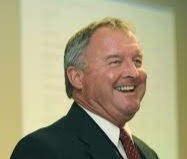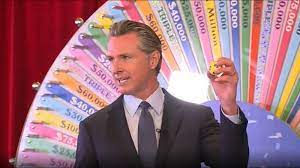It's an Off-Year, So Santa Barbara Voters Only Have to Grapple with Two Elections in 2021
- Newsmakers with JR

- Jun 24, 2021
- 4 min read

On Joe Holland's office wall hangs a framed copy of the 2003 recall ballot that ousted Governor Gray Davis - including the names of Arnold Schwarzenegger and 134 other politicos, media hacks, low-rent movie stars, sex workers and sundry self-promoters who signed up to replace him.
For Holland, the Registrar of Voters for Santa. Barbara County (also: County Clerk, Recorder and Assessor) it's not only a personal memento of the first election that he oversaw, but also a professional reminder to leave no detail overlooked in staging one.
"We ran out of ballots," Holland recalled of that historic 2003 event. "We had a record turnout for a special election."
A tale of two elections. Newsmakers checked in with Joe for an update on his office, as he deals with the logistical complexities of a return from pandemic mode, and prepares to manage two elections, in a year when most local jurisdictions ordinarily would have none.
For starters, there is the city of Santa Barbara's contest for the mayor and three City Council seats.
As an historic matter, it is the last time the city will have its longstanding, odd-year local election; in 2018, voters approved Measure B to move city elections to even years, in line with federal, state and nearly all other municipal elections in California (and against the wisdom of cranky critics who prefer the singular focus on local issues yielded by off-year campaigning without competing and loud political distractions. But we digress).
The transition also represents a boon for the winners of those four SB races, who all will get five-year terms, as the new voting system aligns with the laws of arithmetic.
For Holland, running Santa Barbara's election is a straightforward affair, which his office will administer at a cost of about $400,000 to the city. Santa Barbara uses an all mail-in ballot system which, despite the rantings of Donald Trump, is trustworthy, efficient and effective in increasing turnout.
"Election Day" is Nov. 2 and ballots will be sent out 29 days before that, arriving in early October.
"All vote-by-mail is the modern way of doing things," Holland said. "That's how you get higher turnout."
Prince Gavin faces the music. Far more uncertain and gnarly is the matter of arranging an entirely separate election -- the attempt to recall Governor Gavin Newsom.
On Wednesday, Secretary of State Shirley Weber announced what everyone already knew -- there are enough signatures on recall petitions -- 1,719,900 to be precise -- to put the matter on a statewide ballot. This after a 30-day waiting period that followed submission of the signatures, during which voters who had signed had the opportunity to withdraw their names.
A total of (checks notes), um, 43 did so.
Even though Newsom is heavily favored to stomp the bid to remove him from office, it's still a big deal: of 54 efforts to oust governors since the power of recall was voted into the state constitution in 1911, this is only the second time one actually has qualified. The other, of course, included the singular, unforgettable brief candidacy of Arianna Huffington.
Now the key questions for 2021 are: when will the recall take place and what will the rules for the election be?
Deep in the weeds. After the statewide cost of the election is officially determined, the Secretary of State will formally certify it, then the whole mishegoss goes to Lieutenant Governor Eleni Kounalakis, who will set a special election date somewhere between 60 and 80 days after.
A Democratic Party apparatchik if there ever was one, the Lite Gov is certain to pick a date that looks most favorable to Newsom's chances.
Right now, the conventional wisdom among Dems is, the sooner the better: for now, the pandemic has receded, vaccines are fully available, the economy is starting to come back and the governor is bathing in free money, thanks to unexpected bonus state revenue owing to the Covid stock market boom, plus the zillions of dollars Congress and President Biden approved in pandemic relief.

All of which has allowed Newsom, literally and clownishly, to perform as a game show host, handing out cash to winners of a special state vaccine lottery. Sheesh.
The future lies ahead. Newsom and his allies figure things can only go downhill from here -- think drought, wildfires, power shutoffs, Covid variant surges, who knows, maybe locusts too -- so have urged the recall election be held as early as August.
Election officials throughout the state have said that's too early -- apparently pandemic supply chain interruptions have delayed deliveries of paper needed for ballots, or something -- and that, as a practical matter, the earliest possible date is Sept. 14.
That's a far cry from what Dems were saying a few months ago, when they figured Newsom would do best with an election around Thanksgiving.
Bottom line. Although the Legislature has approved $215 million to be spread among 58 counties to pay for the recall, Holland remains unsure how much Santa Barbara will get; also the terms of the election, - all mail? in-person? a hybrid? - so far are uncertain and could affect local costs, which Holland estimates could cost as much as $25-35 million, depending on the number of names on the ballot, the number of in-person voting sites and how many days those would be open,
"As far as I know, the recall could be anytime between Sept. 14 and the first of December," he said, adding that his office is tanned, rested and ready for anything. We paraphrase.
"State politics are what they are," he added.
JR
Images: Joe Holland (SB Independent); Newsom the game show host (ABC7News).







Comments